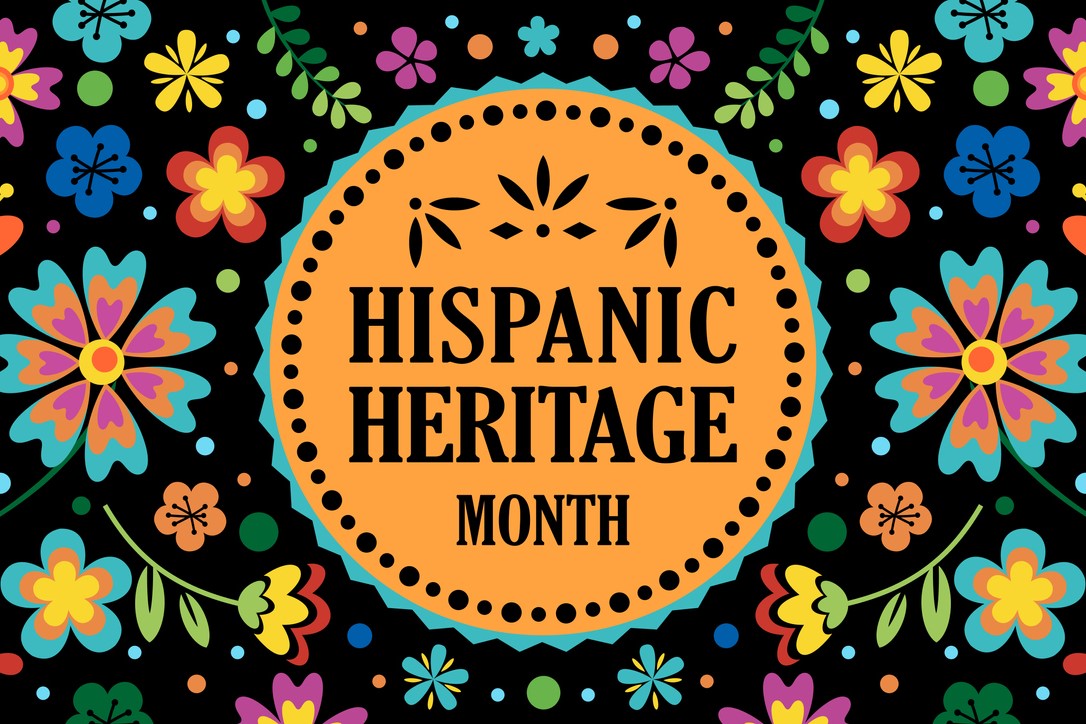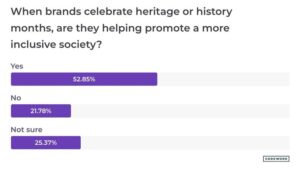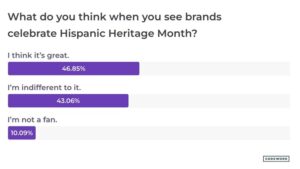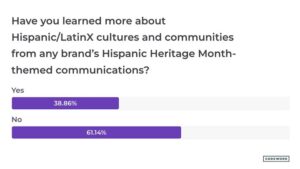Hispanic Heritage Month campaigns fail to educate audiences, according to survey
Findings were culled from a survey of more than 1,000 people on how the campaigns landed.

We’ve wrapped up Hispanic Heritage Month, and instead of celebrating campaigns — or doing the opposite and criticizing those that have fallen short — we wanted to take a broader look.
How are people responding to brands’ HHM campaigns overall? What impact are they having for brands? Or for the Hispanic communities they’re intended to support?
We’re in an industry of self-deprecating know-it-alls who tend to criticize our own work as intensely as we praise it, but we tried to go into this with open minds. Is it possible that for all the perennial, headline-making backlash against specific HHM-themed efforts — this year’s notable entries include the Mexican Week on Great British Bake-Off and the NFL’s cringe Por La Cultura Campaign — heritage months really are doing some good these days? We surveyed over 1,000 people* in late September to find out.
As you might expect, the reactions were mixed, but three themes came through…
Finding #1: Brands’ heritage month efforts are seen as good for inclusion

We started with a basic question: When brands celebrate heritage or history months, are they helping promote a more inclusive society?
53% of our 1,000-person, non-ethnically sorted group said yes. About a quarter said they weren’t sure, while 22% said no.
We also surveyed a smaller group of Hispanic-identifying users — just under 100 people — and the results were similar: Just under 50% said yes, just under a third weren’t sure, and the rest said no.
This matters.
With heritage month-themed campaigns, the marketing world isn’t moving volume for a CPG client, or expanding an install base for a devices company, but we are potentially, hopefully, increasing positive and accurate perceptions of a community. Our finding suggests that companies should keep celebrating these months because increased familiarity of anything — a product, a neighbor, a whole people — can lead to acceptance.
Finding #2: Brands’ Hispanic Heritage Month efforts yield a mix of approval and indifference

However people may feel about heritage months and brand campaigns in general, there’s no consensus on how brands’ HHM campaigns are landing with consumers. Among our general group, nearly as many people said they were indifferent to brands’ HHM campaigns (43%) as said they liked them (47%). The rest — 1 in 10 — said they didn’t like them, period.
In our Hispanic respondents group, there was more enthusiasm for HHM campaigns — about 53% said they approved — while 40% expressed indifference.
Among those leaving comments, meanwhile, negative sentiment prevailed. Many were centered around the performative nature and tone of the campaigns this past month.
“It’s a commodification of a marginalized group,” one person wrote.
The fact that a significant proportion of people are either unmoved or downright annoyed with HHM efforts didn’t come as a surprise. Why wouldn’t people feel this way, when some brands quite literally invade their community’s spaces and dip out when the month of celebration ends?
Finding #3: If brands are aiming to educate people with HHM content, they’re largely failing

While we examined inclusion with our first question, we were also curious about whether people are learning more about Hispanic cultures and communities through brands’ campaigns. Surely with all the incorporation of Spanish language, emphasis on Hispanic trailblazers, and, yes, spotlights on ethnic cuisine, people would feel more informed and knowledgeable, right?
Well, maybe not.
More than 60% of respondents in our general users group told us they had not learned more about Hispanic cultures and communities through brands’ HHM campaigns. One person shared a cynical, if not surprising, perspective on brands’ efforts: “[T]hey do not care about anyone’s heritage. [T]hey care about money.”
Making an impact with long-term efforts and meaningful conversations
Users’ underwhelming responses to Hispanic Heritage Month in questions 2 and 3 added a new dimension to a question we’d been considering for a while: Why not extend heritage month efforts, including those taking place during HHM, year-round? These efforts don’t need to happen with the same intensity as those taking place during the month itself, but perhaps on a smaller scale. Not only would it reassure people that brands are committed to celebrating and honoring their communities for the long haul, it would take some of the pressure off brands, too. Packing so much into a short period can pressure brands to act in a reactive manner, and expose them if the thing they create doesn’t quite land.
It’s important to note that there’s a difference between tone-deaf efforts that spark criticism, and efforts to promote meaningful — if heated — conversations. For all the Hispanic Heritage Month highlight reels that are sure to include the usual suspects (Frida Kahlo, Bad Bunny, Cesar Chaves), there are one or two by prominent figures in our industry asking questions to problems we’re still working through, like representation in media, leadership circles and lack of community investment.
In the case of that last point, it’s worth noting that when we asked Hispanic-identifying respondents how brands can best mark HHM, the most popular answer was investing in Hispanic communities.
We at Codeword inadvertently sparked some backlash ourselves among our survey respondents when we used the gender-neutral term “LatinX” in survey questions. Several remarked that the term is offensive because Spanish is itself a gendered language — a concern I could understand, though I’ll note that among my own friends and family, when the term is discussed, it’s more often dismissed than actively decried.
While diving into serious issues such as these can dampen spirits during a month devoted to celebration, they’re a reminder and marker for community progress, and in this sense, it’s great to have a month where these discussions are elevated.
Staying close to your strengths
On a personal note, this past month my family was delighted to see our experiences reflected in the media in a way we’d never experienced. While not perfect shows, “MO” on Netflix and “This Fool” on Hulu are examples of brands narrowing societal or representational gaps in ways that align with what they’re good at, resulting in something enjoyable for people to celebrate. Staying close to your strengths as a brand is a great way to succeed in heritage month-oriented work — financial institutions move capital that helps Hispanic-owned businesses, marketing agencies create narratives that promote inclusion, and commercial real estate firms can impact spaces where people build community.
There are also other efforts worth celebrating, like PNC and Chase highlighting the value of diverse workforces and their positive impacts on businesses, and the many companies spreading goodwill through smaller scale community efforts and direct investment.
Next year our opinions may shift with what we regard as acceptable, fun, or valuable during Hispanic Heritage Month, but for now I’ll enjoy this meme (over and over again) and do a rewatch of avocados getting peeled on GBBO.
For all the good, bad, and questionable things that come out of heritage months, they’re never short on food for thought.
*We shared a questionnaire with 1,000 users of the polling platform OnePulse. Their ethnicities were not recorded. The questions posed were:
- When brands celebrate heritage or history months, are they helping promote a more inclusive society?
- What do you think when you see brands celebrate Hispanic Heritage Month?
- Have you learned more about Hispanic/LatinX cultures and communities from any brand’s Hispanic Heritage Month-themed communications?
We also surveyed 97 OnePulse users who identified as Hispanic. The first two questions posed to them were the same as those provided to the larger group. The last question was different: “What is the best way for brands to mark Hispanic Heritage Month?”
Arturo Gutierrez is the SVP of Strategy at Codeword. A former management consultant having advised Fortune 500 clients across the Americas, Europe and the Middle East, Arturo’s expertise include leadership, marketing strategy, and organizational growth.






